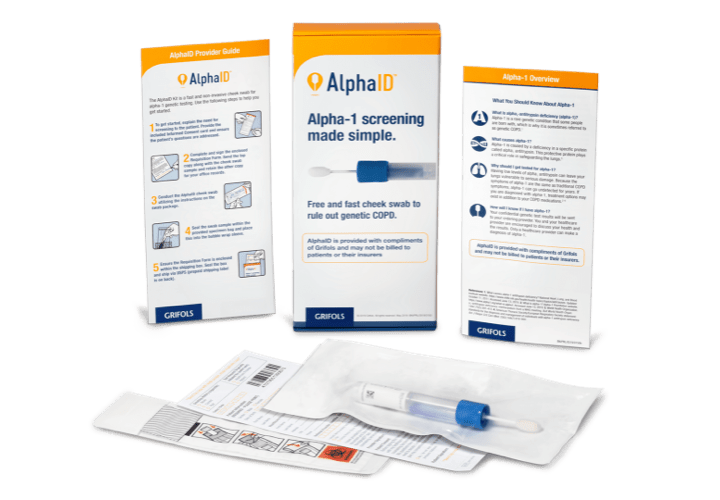Alpha-1 Is the #1 Known
A clear connection between COPD and AAT deficiency
Alpha1-antitrypsin (AAT) deficiency, also called alpha-1 or genetic COPD, is a relatively common but widely underdiagnosed inherited condition that increases the risk of early onset COPD and of liver disease.2-4 AAT deficiency is the most common genetic risk factor for COPD, a highly prevalent, debilitating lung condition.1,5
COPD in the United States:
- Affects 1 in 8 people aged 45 and older5
- Prevalence of ~16 million6
- 4th leading cause of death5
AAT deficiency is not rare; it is rarely diagnosed3
The estimated prevalence of AAT deficiency:
- ~16 million Americans have COPD6
- ~15% of patients have at least 1 abnormal allele and could be at increased risk of COPD and liver disease4,7
- ~1 in 100 have a severe AAT deficiency8
- ~90% of people with AAT deficiency remain undiagnosed8
Patients with deficient alleles may be more common than you think9
Approximately 1 in 7 patients with COPD or treatment-resistant asthma have at least 1 deficient allele7

~90% of patients with AAT deficiency are undiagnosed8
"It's important to screen them because you're not going to find them any other way. They look the same. They smell the same. They walk the same. They cough the same. They have all the same symptoms as your other COPD patients, so the only way to know is screening."
— Corinne Young, FNP-C, FCCP
Colorado Springs Pulmonary Consultants
AAT deficiency is underrecognized9
Three lines of evidence demonstrate that AAT deficiency is widely underrecognized9:
Benefits of increasing detection and early diagnosis of AAT deficiency9,10
- Identifies carriers of AAT-deficient alleles, which can be passed on to children9
- Identifies those with severe AAT deficiency so available treatment options may be considered for appropriate patients9
- Provides incentive for smoking cessation10
- In a follow-up study, 59% of patients with severe alpha-1 attempted to quit smoking after receiving test results and minimal counseling11
There are lifestyle modifications and FDA-approved treatment options for patients with severe AAT deficiency

The receipt of these free testing services does not create any expectation or obligation to purchase or use any product or service offered by any manufacturer.
Up Next: Pathophysiology of Alpha-1
FEV1, forced expiratory volume in 1 second.
References:
- Silverman EK. Genetics of COPD. Annu Rev Physiol. 2020 February 2020;82:413-431. doi:10.1146/annurev-physiol-021317-121224.
- Campos MA, Wanner A, Zhang G. Sandhaus RA. Trends in the diagnosis of symptomatic patients with a1-antitrypsin deficiency between 1968 and 2003. CHEST. 2005;128(3):1179-1186.
- Stoller JK. Myths and misconceptions about a1-antitrypsin deficiency. Arch Intern Med. 2009; 169(6): 546-550.
- Stoller JK, Aboussouan LS. A review of alpha-1 antitrypsin deficiency. Am J Respir Crit Care Med. 2012;185(3): 246-259.5. National Heart, Lung, and Blood Institute.
- COPD National Action Plan. NIH: National Heart, Lung, and Blood Institute. February 9, 2021. Accessed June 3, 2024. https://www.nhlbi.nih.gov/health-topics/education-and-awareness/COPD-national-action-plan.
-
About COPD. Centers for Disease Control and Prevention. May 15, 2024. Accessed June 3, 2024. https://www.cdc.gov/copd/about/index.html..
-
Data on file. Alpha-1 Genetics Laboratory.
-
Brantly M, Campos M, Davis AM, et al. Detection of alpha-1 antitrypsin deficiency: The past, present and future. Orphanet J Rare Dis. 2020;15(1):96. doi:10.1186/s13023-020-01352-5
-
de Serres FJ. Environ Health Perspect. 2003;111(16):1851-1854.
- Stoller JK. Detecting alpha-1 antitrypsin deficiency. Ann Am Thorac Soc. 2016;13(Suppl3): S317-S325.
- American Thoracic Society/European Respiratory Society. American Thoracic Society/European Respiratory Society statement: standards for the diagnosis and management of individuals with alpha-1 antitrypsin deficiency. Am J Respir Crit Care Med. 2003;168(7):818-900.
- Carpenter MJ, Strange C, Jones Y, et al. Does genetic testing result in behavioral health change? Changes in smoking behavior following testing for alpha-1 antitrypsin deficiency. Ann Behav Med. 2007;33(1):22-28.